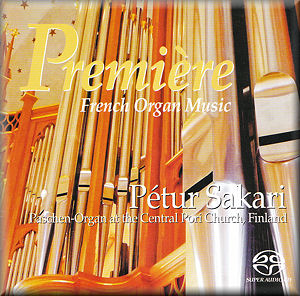 |
 |
|

Availability
CD: Fuga
|
Première – French Organ Music
Jehan ALAIN (1911-1940)
Litanies (1937) [5:07]
Maurice DURUFLÉ (1902-1986)
Scherzo, Op. 2 (1926) [7:21]
Joseph-Guy ROPARTZ (1864-1955)
Introduction et Allegro Moderato (1917) [10:49]
César FRANCK (1822-1890)
Choral III (1890) [15:20]
Prélude, Fugue et Variation, Op. 18 (1862) [11:16]
Léon BOËLLMANN (1862-1897)
Suite Gothique, Op. 25 (1895) [15 #:06]
Louis VIERNE (1870-1937)
Final from Symphony No. 1, Op. 14 (1899) [6:52]
 Pétur Sakari (organ)
Pétur Sakari (organ)
rec. September 2009, January 2010, Central Pori Church, Finland. Stereo/multi-channel
 FUGA 9297
FUGA 9297  [73:15] [73:15]

|
|
|
What is it about the Finns and organ music? Not only do they
have a growing roster of fine organists – Kalevi Kiviniemi,
Ville Urponen, Jan Lehtola and Santeri Siimes among them – they
also have top-notch instruments to choose from, notably those
in the churches of Pori, Helsinki (Kallio), Uusikaupunki and
Lakeuden. To top it all, Alba and Fuga are the two home-based
labels responsible for some of the best organ recordings I’ve
encountered. And still they keep on coming; in addition to this
recital from the young Pétur Sakari – he was just 18 when this
disc was recorded – there’s a new SACD from Kiviniemi as well.
As prodigies go, Sakari is quite exceptional; he took up the
cello at three, started organ studies at eight, and gave his
first organ recital at 13. Not surprisingly, given the guiding
influence of Kalevi Kiviniemi and French organist Thierry Escaich,
Sakari is also a skilled improviser. Sadly, the recital under
review – the punning title is particularly apt for a debut recording
– focuses on established French repertoire; it’s played on the
magnificent Paschen organ of Central Pori Church, which I first
heard on Kiviniemi’s Franck disc (review).
Indeed, one can hear Sakari playing the Vierne Final on this
organ on YouTube;
the video also offers a tantalising glimpse of this lovely,
light-filled building.
Jehan Alain’s audacious Litanies holds no terrors for
our young organist, who springs and articulates this music very
well indeed. As usual with recordings from this source reverberation
is well controlled, allowing listeners to revel in the detail
and dynamics of this mercurial piece. The Stygian pedals are
thrilling, Sakari summoning order out of chaos in the huge,
rolling climaxes and sustained finale. What an arresting entrée,
and what a fine foil to Maurice Duruflé’s early Scherzo.
The Pori instrument’s silvery upper registers add lustre
to those suspended, dancing figures, all underpinned by a characterful
bass.
Two glorious pieces, and a perfect example of complementary
programming. Cue the brazen glow of Breton Joseph-Guy Ropartz’s
Introduction et Allegro Moderato, a veritable vortex
of a piece, It’s a measure of Sakari’s skill that he sails between
Scylla and Charybdis without coming to grief. Indeed, there’s
a square-jawed determination here that would be impressive in
a seasoned organist, let alone one at the start of his career.
There’s beauty, too, and organ buffs will surely marvel at the
vast, pealing apotheosis. What a sublime noise this is, and
superbly recorded to boot.
As for the two Franck pieces, they’re just as compelling; even
when placed alongside illustrious rivals these performances
won’t be found wanting. There’s no escaping the ‘splashy summation’
of Choral III, but the build-up is adroitly done, those
fan-like figures especially beautiful. Apart from the cacophonous
climax – a little too overpowering, perhaps – Sakari
finds an element of soft-edged inwardness here that’s most attractive.
Ditto in the delicate Prélude, Fugue et Variation, where
judicious registration and a keen sense of scale make for a
winning account. As for Franck’s entwined inner voices, they’re
very well projected, and rhythms deftly executed too.
Léon Boëllmann’s Suite Gothique is one of the more formidable
pieces in the organ repertoire, and for once the impetuous playing
and huge, unfettered sound is entirely right, the Introduction
quite intimidating in its scale and weight. Even in this melée
one can only blink in astonishment at the level of detail buried
in that panoply of notes, Sakari making the most of the contrasts
between this movement and the mobile minuet that follows. Clarity
and focus is all in this music, and the forensic, fearless recording
can only help. And what a gorgeous sound the organ makes in
the Prière à Notre Dame, Sakari conjuring a palpable sense of
that vast, votive space. As for the Toccata, it’s a lumbering
behemoth, the dynamics of which will have your neighbours banging
on the walls.
Sakari brings his debut disc to a close with the rousing Final
from Louis Vierne’s Symphony No. 1. I’ve always found
it a tad relentless, but there’s no denying this is an impressive
performance. That said, I might have preferred a wider range
of pieces – perhaps even an improvisation or two – but there’s
time enough for that. I daresay the temptation is to go for
the works that make the most noise – and why not – but as the
Boëllmann prayer so amply demonstrates there’s more to Sakari’s
musical persona than these monolithic showpieces might suggest.
Debuts don’t come more auspicious than this, and I confidently
predict we’ll hear a lot more from this hugely talented young
man. With the steadying hand of his mentor, the range fine organs
at home, and the attentions of sound engineer Mika Koivusalo,
the future looks very bright indeed. Sakari’s personal liner-notes
and the atmospheric photographs of the church and organ complete
a quality package. There’s even a snap of the organist as a
curly-haired six-year-old seated not at a PlayStation or Xbox,
but at the console of Stockholm’s Finnish Church. Quite remarkable.
An impressive calling card. More, please.
Dan Morgan
http://twitter.com/mahlerei
|
|




 All Nimbus reviews
All Nimbus reviews








